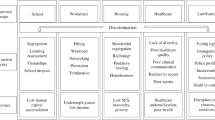Abstract
This article defends ‘relational theorizing’ in bioethics and public health ethics and describes its importance. It then offers an interpretation of solidarity and care understood as normatively patterned and psychologically and socially structured modes of relationality; in a word, solidarity and care understood as ‘practices.’ Solidarity is characterized as affirming the moral standing of others and their membership in a community of equal dignity and respect. Care is characterized as paying attention to the moral (and mortal) being of others and their needs, suffering, and vulnerability. The wager of relational theorizing in health care and public health is that substantive ethical visions of solidarity and care will provide support for more just and egalitarian health care and public health policies.
Similar content being viewed by others
Notes
Certainly, if the import of this distinction on bioethics and public health ethics is relatively new, the distinction itself and discussion of these theoretical forms are not new in moral philosophy and moral psychology. They were central to the debate 40 years ago between Lawrence Kohlberg and Carol Gilligan, which Jürgen Habermas tried to mediate with his communicative ethics. See Wren [25].
Some versions of utilitarianism may be an exception to this, in so far as they take pain and pleasure as such to be the sources of good or evil in the world, quite independently of how these philosophical substances are embodied in, or experienced by, individual beings, and regardless of how such embodiment or experience is distributed in a society.
Relational bioethics is conceptually dynamic and pluralistic, frequently drawing on paradigm-shifting work in moral and political philosophy and on conceptual innovations ongoing in the humanities and the social sciences, including feminist theories, critical theories of various kinds, and orientations informed by philosophical pragmatism and hermeneutics, among others. The literature of relational bioethics and similar work in moral philosophy is large and growing. My sketch of it here is selective, glossing over important differences among particular thinkers, but I hope not misleading. My account draws upon [4, 6, 15] in particular.
References
Arras, J. D. (2017). Methods in bioethics: The way we reason now. New York, NY: Oxford University Press.
Brody, H. (2009). The future of bioethics. New York, NY: Oxford University Press.
Callahan, D. (2012). In search of the good: A life in bioethics. Cambridge, MA: MIT Press.
Code, L. (2006). Ecological thinking: The politics of epistemic location. New York, NY: Oxford University Press.
Fox, R. C., & Swazey, J. (2008). Bioethics observed. New York, NY: Oxford University Press.
Gergen, K. J. (2009). Relational being: Beyond self and community. New York, NY: Oxford University Press.
Held, V. (2006). The ethics of care: Personal, political and global. New York, NY: Oxford University Press.
Hutto, D. D. (2008). Folk psychological narratives: The sociocultural basis of understanding reasons. Cambridge, MA: MIT Press.
Jennings, B. (2015). Right relation and right recognition in public health ethics: Thinking through the republic of health. Public Health Ethics, 9(2), 168–177.
Jennings, B. (2016). Reconceptualizing autonomy: The relational turn in bioethics. Hastings Center Report, 46(3), 11–16.
Jennings, B. (2018). Solidarity and care as relational practices. Bioethics. https://doi.org/10.1111/bioe.12510.
Jennings, B., & Dawson, A. (2015). Solidarity in the moral imagination of bioethics. Hastings Center Report, 45(5), 31–38.
Kittay, E. F. (1999). Love’s labor: Essays on women, equality and dependency. New York, NY: Routledge.
Lindemann, H., Verkerk, M., & Walker, M. U. (Eds.). (2009). Naturalized bioethics: Toward responsible knowing and practice. New York, NY: Cambridge University Press.
Nedelsky, J. (2011). Law’s relations: A relational theory of self, autonomy, and law. New York, NY: Oxford University Press.
Nussbaum, M. C. (2011). Creating capabilities: The human development approach. Cambridge, MA: Harvard University Press.
Prainsack, B., & Buyx, A. (2011). Solidarity: Reflections on an emerging concept in bioethics. London: The Nuffield Council.
Prainsack, B., & Buyx, A. (2017). Solidarity in Biomedicine and Beyond. Cambridge, UK: Cambridge University Press.
Silva, D. S., & Viens, A. M. (2015). Infection control measures and debts of gratitude. American Journal of Bioethics, 15, 55–57.
Taylor, C. (1995). Philosophical arguments (pp. 165–180). Cambridge, MA: Harvard University Press.
ter Meulen, R. (2017). Solidarity and justice in health and social care. Cambridge: Cambridge University Press.
Tronto, J. (1994). Moral boundaries: A political argument for an ethic of care. New York, NY: Routledge.
Tronto, J. (2013). Caring democracy: Markets, equity, and justice. New York, NY: New York University Press.
Walker, A. D. M. (1988). Political obligation and the argument from gratitude. Philosophy and Public Affairs, 17, 191–211.
Wren, T. E. (Ed.). (1990). The moral domain: Essays in the ongoing discussion between philosophy and the social sciences (pp. 224–251). Cambridge, MA: MIT Press.
Acknowledgements
An earlier version of this article was presented as The Third Annual Jonathan Montgomery Lecture at the Centre for Health, Ethics, and Law, University of Southampton, on 15 January 2018. A more extended discussion of solidarity and care is presented in Jennings [11].
Author information
Authors and Affiliations
Corresponding author
Rights and permissions
About this article
Cite this article
Jennings, B. Relational Ethics for Public Health: Interpreting Solidarity and Care. Health Care Anal 27, 4–12 (2019). https://doi.org/10.1007/s10728-018-0363-0
Published:
Issue Date:
DOI: https://doi.org/10.1007/s10728-018-0363-0




